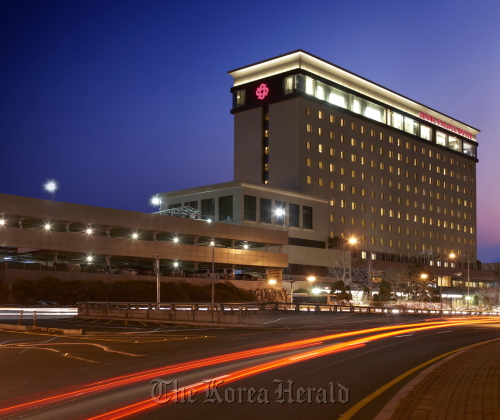Minister Choung says hotels without should not be granted ‘five-star’ grade
Culture Minister Choung Byoung-gug said on Tuesday local hotels should not be granted a “five-star” rank if they do not have a restaurant specializing in Korean cuisine.
Korean hotels are rated differently from those in the West, being rated by the number of mugunghwa, or Rose of Sharon they are awarded. Top hotels in Korea have five mugunghwa.
Choung’s comments came several weeks after he vowed to take a “stern measure” on the Shilla Seoul, one of Korea’s top hotels, for turning away a customer wearing hanbok. The hotel came under fire after turning away Lee Hye-soon, a designer of the Korean traditional dress, from its restaurant saying she was getting in the way of other guests by wearing one.
In the wake of the hanbok controversy, public sentiment turned hostile toward top hotels which do not run a Korean restaurant.
“The government will tighten the standard so that hotels will not receive a top rank without a Korean restaurant,” Choung told reporters at a press meeting.
“Regarding the Shilla Seoul issue, the hotel’s vice president came to see me and I suggested the hotel establish a Korean restaurant,” he said.
“The Shilla Seoul said it will consider it positively.”
Culture Minister Choung Byoung-gug said on Tuesday local hotels should not be granted a “five-star” rank if they do not have a restaurant specializing in Korean cuisine.
Korean hotels are rated differently from those in the West, being rated by the number of mugunghwa, or Rose of Sharon they are awarded. Top hotels in Korea have five mugunghwa.
Choung’s comments came several weeks after he vowed to take a “stern measure” on the Shilla Seoul, one of Korea’s top hotels, for turning away a customer wearing hanbok. The hotel came under fire after turning away Lee Hye-soon, a designer of the Korean traditional dress, from its restaurant saying she was getting in the way of other guests by wearing one.
In the wake of the hanbok controversy, public sentiment turned hostile toward top hotels which do not run a Korean restaurant.
“The government will tighten the standard so that hotels will not receive a top rank without a Korean restaurant,” Choung told reporters at a press meeting.
“Regarding the Shilla Seoul issue, the hotel’s vice president came to see me and I suggested the hotel establish a Korean restaurant,” he said.
“The Shilla Seoul said it will consider it positively.”

However, Shilla Seoul spokesperson Lee Seok-chun said the hotel’s official stance is to “take full time to carefully” consider it, saying running a Korean restaurant can be less competitive than running a Chinese or Japanese restaurant.
“That’s why we scrapped the Korean restaurant in 2005. Instead, we have a Korean cuisine team consisting of eight chefs and we offer Korean cuisines in our buffet restaurant and at wedding banquets upon client’s request,” Lee said.
Korean hotels are rated by the Korea Hotel Association every three years, mostly on their business registration day.
The five-mugunghwa rating is given to those scoring 630 points out of the total score of 700. The latest revision to the Tourism Promotion Law as of March 31 states that the association can give 20 points to a hotel if it runs a Korean restaurant.
Currently, there are 19 five-mugunghwa hotels in Seoul and four of them ― Lotte, Walkerhill, Mayfield and Renaissance Hotel ― run a Korean restaurant.
An official of the hotel association said Choung’s push for promotion of Korean restaurants in the hotel industry could affect the association’s rating standard.
“If the Culture Ministry considers enhancing the standard, the association can submit its opinion to the ministry. But it is likely that the association would follow the ministry’s stance,” said Sung Yeon-sung, an official at the Korea Hotel Association.
If Choung’s comment influences the association’s hotel rating process, Seoul Palace Hotel is likely to become the first victim, as it is preparing to apply for an upgrade of the hotel’s rank from four mugunghwa to five mugunghwa soon.
The hotel, located in Banpo area in southern Seoul, recently spent 27 billion won ($25 million) in renovation with the aim to get the top ranking. However, the renovation didn’t involve establishing a Korean restaurant.
“The purpose of the rank evaluation every three years is to encourage hotels to continually invest in facilities for better services. We have invested 27 billion won in the past three years to improve our products and services,” Seoul Palace Hotel spokesperson Yoon Ji-sook said.
“We are afraid that our hotel could be negatively affected by this issue,” she said.
The hotel plans to apply for an upgrade late this month.
Yoon added that the hotel does have a Korean restaurant, but it is within the hotel’s sauna, limiting access of general visitors. She said the hotel has 28 chefs specializing in Korean foods.
Other hotel industry officials responded with similar skepticism.
An industry insider said the minister’s comment was irresponsible ― establishing a new Korean restaurant is a big management decision because it can cost up to 10 billion won to open one. “I can understand his intention to promote Korean cuisines but who would pay for the cost? It’s not like the government will provide financial support,” the source said.
By Kim Yoon-mi (yoonmi@heraldcorp.com)







![[Graphic News] More Koreans say they plan long-distance trips this year](http://res.heraldm.com/phpwas/restmb_idxmake.php?idx=644&simg=/content/image/2024/04/17/20240417050828_0.gif&u=)
![[KH Explains] Hyundai's full hybrid edge to pay off amid slow transition to pure EVs](http://res.heraldm.com/phpwas/restmb_idxmake.php?idx=644&simg=/content/image/2024/04/18/20240418050645_0.jpg&u=20240419100350)





![[From the Scene] Monks, Buddhists hail return of remains of Buddhas](http://res.heraldm.com/phpwas/restmb_idxmake.php?idx=652&simg=/content/image/2024/04/19/20240419050617_0.jpg&u=20240419175937)

![[KH Explains] Hyundai's full hybrid edge to pay off amid slow transition to pure EVs](http://res.heraldm.com/phpwas/restmb_idxmake.php?idx=652&simg=/content/image/2024/04/18/20240418050645_0.jpg&u=20240419100350)

![[Today’s K-pop] Illit drops debut single remix](http://res.heraldm.com/phpwas/restmb_idxmake.php?idx=642&simg=/content/image/2024/04/19/20240419050612_0.jpg&u=)